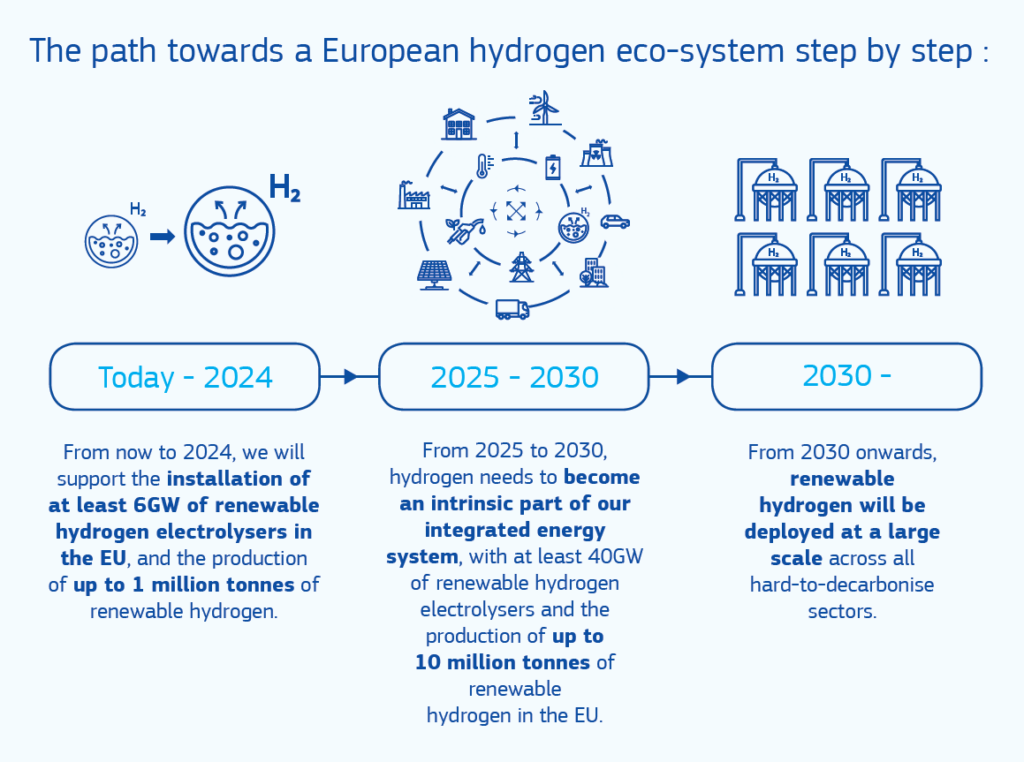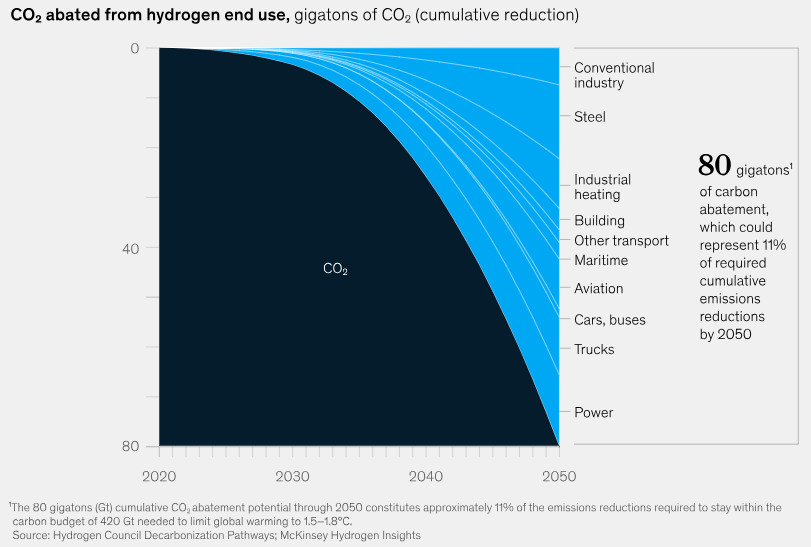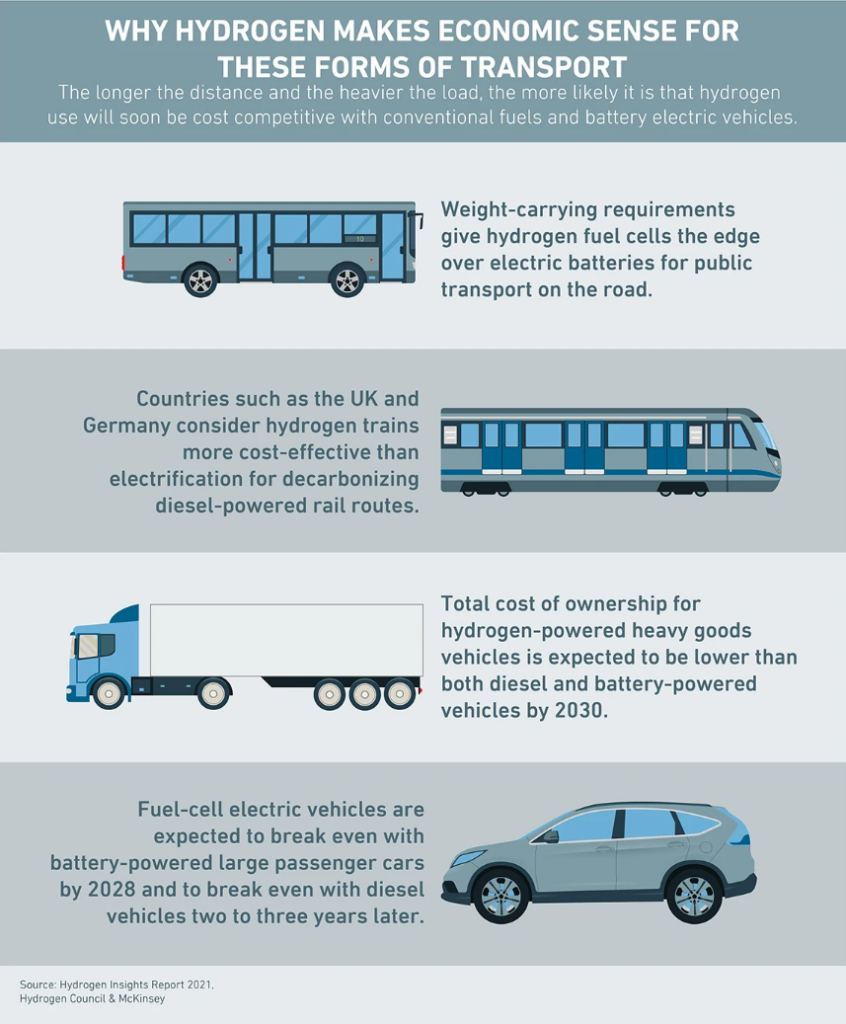The Future Of Hydrogen: Powering The World
29 June 2023 – by Eric Koons Comments (0)
Hydrogen is widely seen as a key component of the world’s future energy mix, with numerous international organisations and experts stressing its importance.
The International Energy Agency (IEA) has identified hydrogen as a critical element for achieving a clean and secure energy future and achieving net zero emissions, highlighting its potential to help reduce carbon emissions across various sectors.
Similarly, the European Union has set ambitious targets for hydrogen production and use to meet its climate goals.
Experts emphasise the potential of hydrogen as a versatile energy carrier that can be produced from various sources, including renewable energy, and used in industries ranging from transportation to manufacturing. Overall, hydrogen will likely play a significant role in shaping the future of energy.
Why Is Hydrogen Referred to as ‘The Fuel of the Future’?
Hydrogen, particularly green hydrogen, offers numerous benefits that make it an excellent fuel source for the future.
1. Near Zero Emissions
One of the key advantages is its emissions during use. However, its overall emissions depend on the initial fuel source used to produce hydrogen. If produced with renewable energy and not natural gas, direct carbon dioxide emissions are nearly zero.
2. Energy Storage for Renewables
Moreover, hydrogen plays a crucial role in addressing one of the major challenges renewable energy faces today: intermittency.
Excess renewable energy can be converted into hydrogen and stored for later use by utilising hydrogen for energy storage. Carbon capture and storage technology can be used for this purpose. This helps overcome the issue of renewable energy variability, ensuring a consistent and reliable energy supply.
3. An Energy Dense Fuel
Additionally, hydrogen boasts high energy density, meaning it can store and deliver large amounts of energy with less weight. This characteristic is particularly valuable for applications such as transportation, where energy density is crucial for long-distance travel.
For comparison, batteries used in electric vehicles have an energy density of about 200 watts per kg, whereas hydrogen fuel cells are closer to 35,000 watts per kg. By using hydrogen fuel cells, vehicles can harness the power of hydrogen to provide clean and sustainable mobility solutions.
4. Hard-to-decarbonise Sectors
In line with hydrogen’s energy density comes its value in decarbonising hard-to-decarbonise industries. Sectors like cement, steel and chemical production require uninterrupted power that batteries cannot supply due to their limited energy density. Green or clean hydrogen can meet these demands and is a feedstock for several industrial processes.
As a result, renewable hydrogen can reduce emissions from steel production by 96% and cement production by 50%. Currently, there are limited other viable decarbonisation options for these industries that contribute to over half of global industrial CO2 emissions.

Future of Hydrogen Energy: Increasing Adoption
Green hydrogen is poised to play a pivotal role in the global shift from fossil fuels. As governments and industries recognise the urgency of decarbonisation, investments in hydrogen technologies are expected to increase.
This transition is already underway, with 26 countries adopting green hydrogen plans. Electrolysis capacity doubled and the number of new green hydrogen projects tripled during 2021.
As the scale of production rises and technology improves, projections show that the costs of producing and utilising hydrogen will decline significantly. The declining production costs, government assistance and supportive policies will drive hydrogen’s widespread adoption across various sectors. This adoption will have a substantial impact on global emissions reduction.
PWC predicts the moderate and steady growth of green hydrogen in the global energy system through niche applications until 2030, with the growth then accelerating over the following decade. By 2050, a demand of anywhere from 150 to 500 million metric tonnes per year is also predicted. This will abate 7 gigatonnes of CO2 annually by 2050 – about 20% of global human-driven emissions.

Hydrogen Fuel Cells: Powering Transportation and Beyond
While the primary emissions reduction will happen through facilitating renewables and industrial applications, hydrogen fuel cells will be integral to the future energy landscape. Due to this, hydrogen fuel cells have been gaining increased attention.
They convert hydrogen into electricity, producing only water and heat as byproducts and consequently have the potential to be a zero-emission power source.
The specific role these fuel cells will play in the coming decades is expected to be significant, particularly in long-haul trucking, shipping and aviation. These categories are crucial to our globalised world, which relies on international commerce and supply chains. Aviation alone accounts for 2.5% of global CO2 emissions.
In the coming decades, hydrogen fuel cells will likely see significant improvements in terms of performance and cost-effectiveness. As research and development efforts continue, catalysts, materials and system design advancements will drive their commercial viability.
This will further enable their integration into other unique applications and generate a growing market ripe for investment.

Hydrogen Production Will Move Away From Fossil Fuels
The green hydrogen revolution can potentially transform several industries and pave the way for a low-carbon future.
However, its success partially hinges on near-term investment to shift away from the fossil-fuel hydrogen production that currently dominates the market. With the support of governments providing favourable policies and the private sector innovating, hydrogen can become a central part of the world’s future energy mix.
Furthermore, it represents a significant economic driver for renewable energy-rich regions. A robust import-export system will develop as hydrogen infrastructure and demand grow.
Not only does this have the potential to create nearly 30 million jobs by 2050, but it will generate USD 2 trillion in global annual revenue. Now is the time for these regions, and the world, to begin capitalising on green hydrogen.
by Eric Koons
Eric is a passionate environmental advocate that believes renewable energy is a key piece in meeting the world’s growing energy demands. He received an environmental science degree from the University of California and has worked to promote environmentally and socially sustainable practices since. Eric’s expertise extends across the environmental field, yet he maintains a strong focus on renewable energy. His work has been featured by leading environmental organizations, such as World Resources Institute and Hitachi ABB Power Grids.
Read more